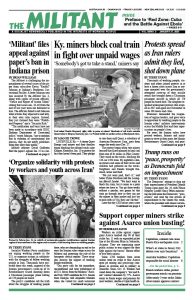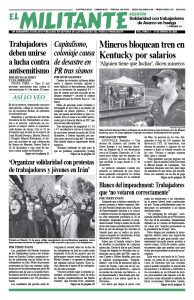January 30, 1995
SALT LAKE CITY, Utah — The fifth Southern Pacific train derailment in the past six weeks in this region occurred January 8. Four locomotives went off the track with 14 cars, two of which rolled into the Colorado River.
Bob Barney, an SP locomotive engineer for 25 years and member of the Brotherhood of Locomotive Engineers, said he had never seen so many derailments in such a short period of time. He blamed the company’s “no rail maintenance” policy. “Years ago you could see section gang members inspecting the tracks. I haven’t seen an inspector in years,” Barney said.
Ron Hyatt, a longtime conductor on the SP and member of the United Transportation Union, [said] the company never acknowledges responsibility for accidents. “They just drug and alcohol test all the crew members and try to pin the blame on the workers.”
January 30, 1970
The thirty-month Nigerian civil war ended January 12 when secessionist Biafra was finally overwhelmed by federal troops. The toll in human lives was at least 2,000,000 dead, more than have perished in the war in Vietnam.
From the beginning, rival imperialist interests intervened in the Nigerian civil war, seeking to deepen their influence on the African continent. Both sides accepted and sought aid from the most reactionary sources, and each accused the other of making important concessions to imperialism to secure military backing.
Washington maintained an ostentatious neutrality, but tacitly supported the Nigerian government, while providing some $80,000,000 in food relief for Biafra — a “humanitarian” policy that was also designed to assure its influence there if the Biafrans should win their bid for independence.
January 27, 1945
After 13 months confinement behind federal prison bars, the 12 Socialist Workers Party and Minneapolis Truckdrivers’ Local 544-CIO leaders railroaded under the Smith “Gag” Act were released this morning from Roosevelt’s penitentiaries.
All the prisoners showed in their eyes and their pale skins the effects of the incarceration for defending the interests of the working class and upholding the principles of revolutionary socialism. But elation over their freedom and eagerness for renewed struggle predominated in the expressions and words of the Trotskyist leaders.
James P. Cannon, National Secretary of the Socialist Workers Party, stated: “We are glad to be out. The work of the party in our absence shows that our party is based on ideas and cannot be halted in its work by the imprisonment of a few individuals.”

